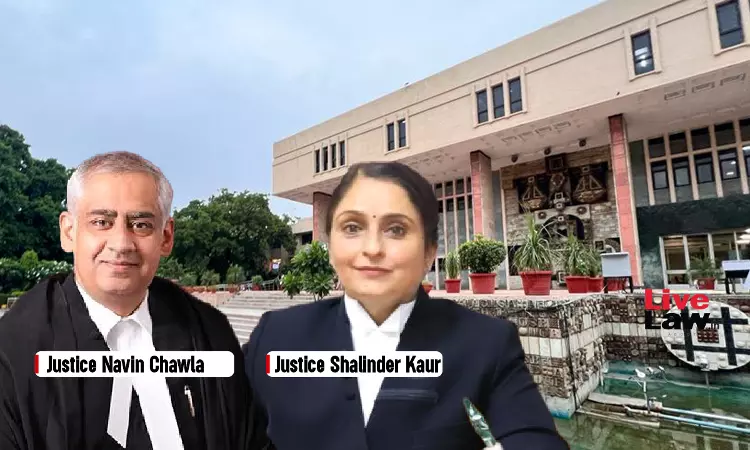- Home
- /
- High Courts
- /
- Delhi High Court
- /
- BSF Constable Losing Left Eye In...
BSF Constable Losing Left Eye In Militant Encounter; Delhi High Court Rejects Union's Opposition , Grants Lump Sum Compensation
Pranav Kumar
25 May 2025 9:09 AM IST
Delhi High Court: A Division Bench consisting of Justices Navin Chawla and Shalinder Kaur allowed a writ petition filed by a retired BSF officer. The court directed the Union of India to provide lump sum compensation to the retired BSF officer, for a disability that he suffered in the line of duty. The Court held that he was entitled to compensation under Rule 9(3) of the Central...
Delhi High Court: A Division Bench consisting of Justices Navin Chawla and Shalinder Kaur allowed a writ petition filed by a retired BSF officer. The court directed the Union of India to provide lump sum compensation to the retired BSF officer, for a disability that he suffered in the line of duty. The Court held that he was entitled to compensation under Rule 9(3) of the Central Civil Services (Extraordinary Pension) Rules, 1972 (“CCS (EOP) Rules”), since his disability was attributable to his service. The Court also explained that any delay by the disabled in approaching the court is not a valid reason to deny disability compensation.
Background
Jagtar Singh joined the BSF in 1996 as a constable. Over the years, he was promoted to Sub-Inspector. In 1993, Jagtar Singh was shot in the face during a militant encounter, while he was on a cordon and search operation in Jammu and Kashmir. This injury caused permanent damage to his left eye and fractured many of his facial bones. Despite undergoing timely surgery, he lost all vision in his left eye.
After the injury, his condition kept getting worse. Despite being assessed with 30% permanent disability in 2004, he continued to work till he retired in 2005. However, he was denied any further promotion (due to his medical condition), and was only provided with his regular pension. No disability pension or ex-gratia compensation was granted. Aggrieved, he approached the High court under Article 226.
Arguments
Jagtar Singh argued that his disability was directly caused by injuries, which were sustained while on duty. Further, the medical board also had confirmed that the disability was attributable to service. Thus, he argued, that under Rule 3-A of the CCS (EOP) Rules, he was entitled to disability benefits. Further, he submitted that any delay in claiming this pension could not be held against him. Relying on Dharamvir Singh v. Union of India, Civil Appeal No. 4949 of 2013, he argued that a claim for disability pension is a continuing cause of action and not a one-time grievance.
The Union of India argued that the pension claim suffered from delays and laches. They explained that Jagtar Singh had superannuated in 2005, but had filed the writ petition only in 2019. They argued that under Rule 6 of the CCS (EOP) Rules, disability claims must be raised within five years. Since he was not retrenched on medical grounds and retired at the age of superannuation, the Union argued that he did not qualify under Rule 9, CCS (EOP) Rules.
Court's Reasoning
Firstly, the court addressed the question of delay. The court held that his disability had only been assessed in Feb 2004, just one year after retirement. Further, the court explained that Jagtar Singh was also denied a promotion in 2003, due to the effect of the injury. Thus, the court held it was unreasonable to expect that Jagtar Singh should have applied for compensation within 5 years of the injury.
Secondly, the court cited Ex-Sep Chain Singh v. Union of India, Civil Appeal Diary No. 30073/2017. The court noted that claims that are related to pension and disability compensation are considered to be continuing wrongs. Thus, the court held that a delay in seeking the same is not fatal, especially when no third party rights are being impacted.
Thirdly, the court spoke of Rule 3-A of the CCS (EOP) Rules. Rule 3-A provides that any disability that is attributable to govt service, qualifies for compensation. Further, Rule 9 distinguishes between those who are retrenched due to the disability, and those who are retained despite it. The latter are entitled to a lump sum compensation, while the former are provided with a monthly disability pension. The court explained that Jagtar Singh's case falls in the latter category, and thus, he is entitled to a one-time lump sum compensation under Rule 9(3).
Fourthly, the court noted that Jagtar Singh had a permanent disability of 30% that was medically certified as attributable to service. Further, he was not boarded out, but was instead retained in service and superannuated at age. Thus, while he was not entitled to a monthly disability pension, the court explained that he was entitled to a one time compensation under Rule 9.
Thus, the court allowed the writ petition. Union of India was directed to disburse the lump sum compensation within three months.
Title: JAGTAR SINGH v. UNION OF INDIA & ORS.
Citation: 2025 LiveLaw (Del) 613
Decided on: 19.05.2025
Case No. W.P.(C) 6466/2019
Counsel for the Petitioner: Mr. Ankur Chhibber
Counsel for the Respondents: Mr. Bhagwan Swarup Shukla with Mr. S. Kumar and Mr. Satyam Singh



